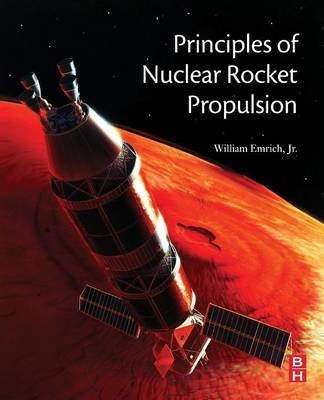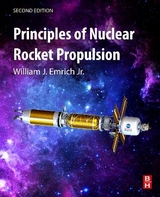
Principles of Nuclear Rocket Propulsion
Butterworth-Heinemann Inc (Verlag)
978-0-12-804474-2 (ISBN)
- Titel erscheint in neuer Auflage
- Artikel merken
Future crewed space missions beyond low earth orbit will almost certainly require propulsion systems with performance levels exceeding that of today’s best chemical engines. A likely candidate for that propulsion system is the solid core Nuclear Thermal Rocket or NTR. Solid core NTR engines are expected to have performance levels which significantly exceed that achievable by any currently conceivable chemical engine. The challenge is in the engineering details of the design which includes not only the thermal, fluid, and mechanical aspects always present in chemical rocket engine development, but also nuclear interactions and some unique materials restrictions.
William J. Emrich, Jr. has worked as a senior engineer at NASA Marshall Center for almost 35 years investigating numerous advanced propulsion concepts for travel in deep space. Most recently he worked as the project manager and principal investigator of the Nuclear Thermal Rocket Element Environmental Simulator (NTREES) which is a one of a kind facility that he developed to recreate the harsh operating environments present in operating nuclear rocket engines and where now nuclear rocket fuel elements are tested to their limits to evaluate their survivability. In 2015, as a result of his efforts in developing the NTREES facility he became only the second Marshall employee to win the AIAA Engineer of the Year award. To acknowledge this award, the city Huntsville, Alabama designated the day he received the award as William Emrich day. Now retired from NASA, he is currently an adjunct professor at the University of Alabama in Huntsville where he teaches a course in nuclear rocket propulsion and mentors young engineers seeking to pursue a career in that field. William Emrich is a registered Professional Engineer in the state of California and is a fellow in the American Society Mechanical Engineers and an associate fellow in the American Institute of Aeronautics and Astronautics.
1. Introduction2. Rocket Engine Fundamentals3. Nuclear Rocket Engine Cycles4. Interplanetary Mission Analysis5. Basic Nuclear Structure and Processes6. Neutron Flux Energy Distribution7. Neutron Balance Equation and Transport Theory8. Multigroup Neutron Diffusion Equations9. Thermal Fluid Aspects of Nuclear Rockets10. Turbomachinery11. Nuclear Reactor Kinetics12. Nuclear Rocket Stability13. Fuel Depletion Implications for Long Duration Operation14. Shielding of Nuclear Rockets15. Materials for Nuclear Thermal Rockets16. Nuclear Rocket Engine Testing17. Advanced Nuclear Rocket Concepts
| Erscheinungsdatum | 11.08.2016 |
|---|---|
| Verlagsort | Woburn |
| Sprache | englisch |
| Maße | 191 x 235 mm |
| Gewicht | 720 g |
| Themenwelt | Technik ► Elektrotechnik / Energietechnik |
| Technik ► Fahrzeugbau / Schiffbau | |
| Technik ► Luft- / Raumfahrttechnik | |
| ISBN-10 | 0-12-804474-8 / 0128044748 |
| ISBN-13 | 978-0-12-804474-2 / 9780128044742 |
| Zustand | Neuware |
| Haben Sie eine Frage zum Produkt? |
aus dem Bereich



